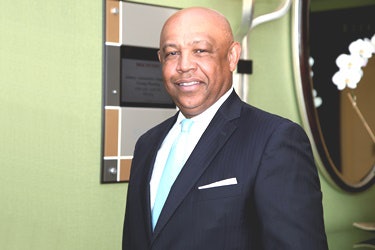 John Grant is ESPN’s executive director of the Air Force Reserve Celebration Bowl.
John Grant is ESPN’s executive director of the Air Force Reserve Celebration Bowl.Historically Black colleges, once the prime source for a generation of the nation’s top professional football players, are set to be back in the national spotlight this weekend when the ABC Television Network puts two HBCUs center-stage in this season’s first college football bowl game.
North Carolina A&T University, the champion of the Mid-Eastern Athletic Conference (MEAC), and Alcorn State University, the winner of the Southwestern Athletic Conference (SWAC), are set for Saturday’s Air Force Reserve Celebration Bowl to be played in Atlanta’s Georgia Dome and telecast nationwide on ABC as it kicks off the bowl season.
It’s the first time in college football history for such a bowl pitting the two HBCU conference champions on a free television nationwide network broadcast. It reflects a rare opportunity for HBCUs to be recognized nationwide with paying the millions an institution might otherwise have to pay for such high-level brand name advertising.
The first-of-its-kind bowl game also represents a major risk for ABC and ESPN, the network’s subsidiary that owns the Celebration Bowl and has put millions of dollars into it, including $1 million for each college conference.
“There’s a generation of people, like an underserved market, who know little or nothing about HBCUs,” says John Grant, ESPN’s executive director of the Air Force Reserve Celebration Bowl. “To have your sporting event on a major network is really about recruiting students, not just student athletes,” says Grant, stressing the potential widespread impact a bowl appearance could have on an institution’s future.
Grant, a former veteran executive of 100 Black Men of Atlanta, is not a newcomer to promoting college football events. He helped run the Atlanta Football Classic for many years, he says, and recalls the history of others. They are no easy task to pull together, stage and execute but worth the challenge, he adds.
As for this bowl game, Grant says ESPN has signed a six-year contract with the two major HBCU athletic conferences to stage the Celebration Bowl and he sees it as a long-term investment and payout for the network and participating institutions. Each conference shares its $1 million bowl guarantee among member institutions based on a predetermined formula.
The Air Force Celebration Bowl, scheduled to start at noon, is to be preceded by ABC’s standard two-hour bowl season kickoff broadcast featuring a roster of college football legends. The bowl game and telecast will be preceded by several days of related activities at venues around Atlanta. Grant says all of the events — tours, meal functions, etc. — are designed to refocus a spotlight on the wider roles HBCUs have historically played and can still play in American higher education.
Those roles have been increasingly overshadowed in the past generation by the loss of constant institutional name recognition and identity as more and more Black student athletes associated with HBCUs began attending historically White institutions in the 1970s and beyond. The bowl game won’t fully address that loss of presence, Grant says, but it will certainly help.
Being selected for a nationally televised bowl game is already putting Alcorn State into a higher gear.
“A lot of people have already circled the date on their calendar,” says Alcorn State athletic director Derek J. Horne, noting he expects many Alcorn fans to make the trip to Atlanta from the rural Mississippi town of Lorman and even more to see the university’s team on television in the bowl game.
Horne, a native of Quitman, Georgia, who is now in his second season as athletic director at Alcorn, says being in a nationally televised bowl game is much more than has been the impact historically of showcasing a respective institution’s football team.
For sure, Alcorn and North Carolina A&T get several free opportunities to put polished ads about their institutions in the game broadcast slots for public service ads. There will be “pageantry” to showcase all that the institutions have to offer. The high-profile bowl games will also give each institution several chances to entice people to its website where unlimited information about an institution can be found.
“We get to drive people to click our website to see what we have to offer,” says Horne, speaking of the larger benefit to the institution of having a key role in a bowl game.
Dennis Thomas, commissioner of the MEAC, says this month’s bowl is the culmination of nearly a decade’s work to get the conferences and a network on the same page. It has several predecessors, the veteran college athletics leader says.
For one reason or another, the HBCU bowl idea “wasn’t sustainable,” he says.
This time “the stars kind of lined up, the moon was full, we had the right kind of sponsors,” Thomas says in describing the successful convergence of a lot of interests and ideas behind the same effort.
“We thought this was a unique opportunity we needed to take advantage of at this time,” Thomas says of the two conferences and ESPN. “It’s going to be more than just a bowl game.”


















